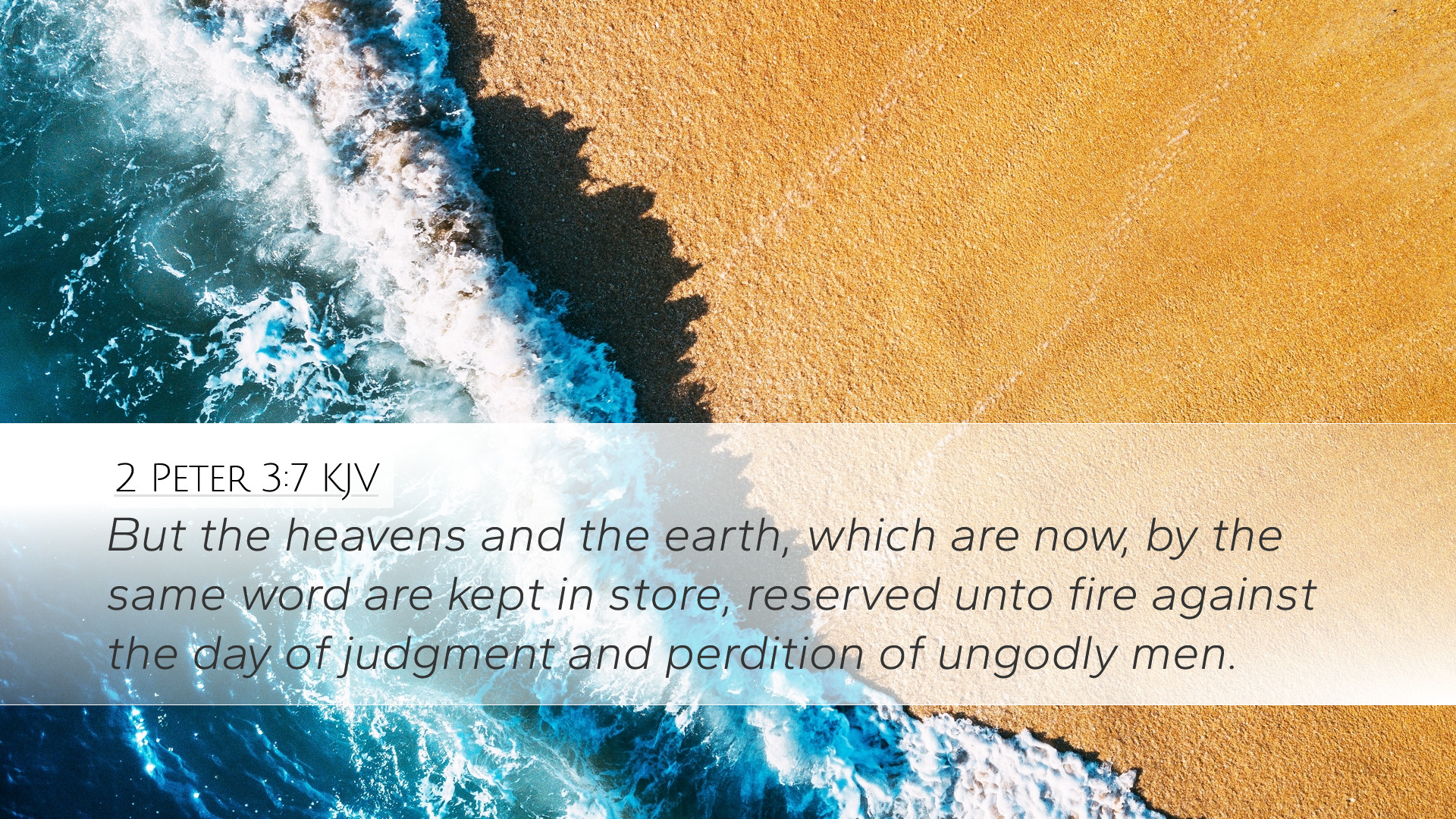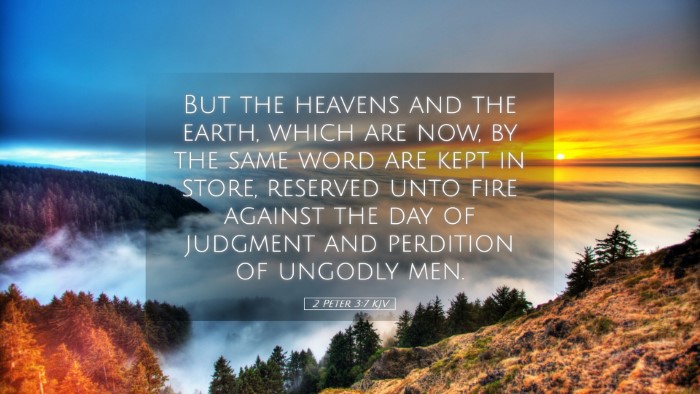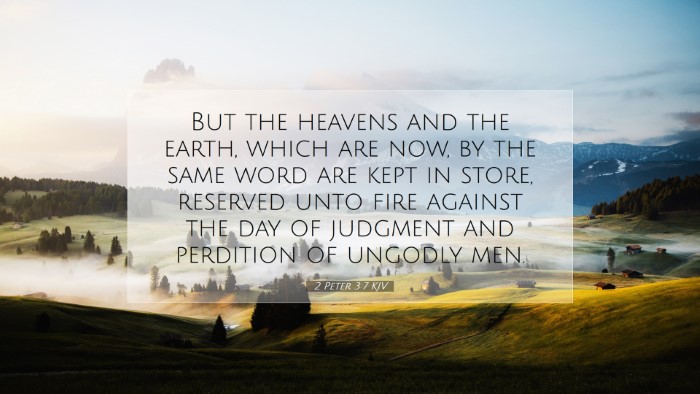Old Testament
Genesis Exodus Leviticus Numbers Deuteronomy Joshua Judges Ruth 1 Samuel 2 Samuel 1 Kings 2 Kings 1 Chronicles 2 Chronicles Ezra Nehemiah Esther Job Psalms Proverbs Ecclesiastes Song of Solomon Isaiah Jeremiah Lamentations Ezekiel Daniel Hosea Joel Amos Obadiah Jonah Micah Nahum Habakkuk Zephaniah Haggai Zechariah Malachi2 Peter 3:7
2 Peter 3:7 KJV
But the heavens and the earth, which are now, by the same word are kept in store, reserved unto fire against the day of judgment and perdition of ungodly men.
2 Peter 3:7 Bible Commentary
Commentary on 2 Peter 3:7
Verse Reference: 2 Peter 3:7 (KJV) - "But the heavens and the earth, which are now, by the same word are kept in store, reserved unto fire against the day of judgment and perdition of ungodly men."
Introduction
The epistle of 2 Peter addresses the hope of the believers while simultaneously confronting pressing challenges, particularly concerning the return of Christ and the final judgment. Verse 7 serves as a pivotal point in Peter's admonition regarding divine judgment and the eternal fate of creation.
Exegesis of 2 Peter 3:7
This verse asserts that the current creation, consisting of the heavens and the earth, is sustained by God's powerful word. It underscores several theological principles, which can be examined through the insights of respected commentators.
The Nature of Preservation
Matthew Henry emphasizes that “the same word” that created the world is also responsible for its preservation. This statement affirms God's sovereignty over His creation. The notion of being "kept in store" suggests an ongoing divine process, implying that nothing occurs outside His will.
Albert Barnes elaborates on the concept of preservation. He indicates that just as the world was created by God's command, so is it sustained by that same command. The phrase "kept in store" reflects a deliberate safeguarding, hinting at a future purpose, particularly the impending judgment.
Reserved Unto Fire
The verse states that the heavens and the earth are “reserved unto fire.” Adam Clarke interprets the phrase as a divine preparation for cleansing and judgment. This fire symbolizes not only destruction but also purification, akin to the process of refining precious metals. This duality of fire serves as a warning and a promise of renewal.
Matthew Henry adds that the fiery judgment indicates the severity of God's response against ungodliness and unrighteousness. It reflects God's righteousness in dealing with sin and demonstrates His intention to restore creation to its intended order through divine judgment.
Day of Judgment
The "day of judgment" is a critical concept in Christian eschatology. Albert Barnes notes that this phrase expresses a specific time predetermined by God when He will judge the ungodly. This judgment is not arbitrary but stems from God's inherent righteousness—a theme emerging throughout both Testaments.
This acknowledgment of judgment engenders a sense of urgency in the believer's life, reinforcing the need for holiness and readiness, as suggested by Matthew Henry. The fiery judgment serves as a backdrop against which the grace of God shines more brightly, presenting a call to repentance and reconciliation with the Creator.
Theological Implications
The examination of 2 Peter 3:7 reveals several pivotal theological implications for believers and scholars alike.
- The Sovereignty of God: The text reinforces God's absolute authority over creation. He not only created but also maintains the universe according to His divine will.
- The Certainty of Judgment: The warning about judgment serves to remind humanity of the reality of accountability before God. The "reserved unto fire" points to an unavoidable outcome for those who persist in ungodliness.
- The Hope of Restoration: While the verse addresses judgment, it simultaneously highlights the hope of renewal. The consuming fire may lead to the transformation of creation, suggesting a new heaven and a new earth free from sin.
- The Call for Vigilance: Understanding the implications of this verse inspires believers to live with vigilance and integrity, recognizing the time and the importance of their witness in a world prone to corruption.
- The Balance of Justice and Mercy: The judgment mentioned is a testament to God’s justice; however, His continued patience promotes the opportunity for mercy and repentance.
- The Testimony of History: The preservation of creation serves as a reminder of God’s faithfulness, where past judgments (like the Flood) testify to His unwavering commitment to righteousness and justice.
- The Assurance of Scripture: The affirmation of prophetic judgment provides believers with a basis for hope, found in the consistent testimony of Scripture regarding God’s dealings with humanity.
- The Urgency of Evangelism: The reality of eternal judgment compels believers to actively share the message of salvation, underlining the importance of bringing others to Christ before it's too late.
- The Promise of Future Glory: Believers are eventually called to a future that is free from sin—this gives them a unique perspective on their current challenges and tribulations, encouraging endurance in hope.
- Application for the Church: This verse reminds the church of its mission to prepare believers to stand firm in faith amidst challenges and to be ever watchful in light of Christ’s return.
- The Reality of Spiritual Warfare: The ongoing struggle against ungodliness indeed portrays the larger spiritual conflict present in the world, emphasizing the need for a strong and equipped body of Christ to engage in the battle before the coming day of the Lord.
- The Importance of Holiness: The anticipation of judgment heightens the call for holiness among believers, pressing them towards a lifestyle of purity, prayer, and piety in anticipation of Christ's return.
- The Impact of a Godly Life: The mention of ungodly men ties into the broader discourse on the impact of a believer’s life in contrast to a life lived in rebellion against God. Living a godly life serves as both a witness and a challenge to others.
- The Motivation to Pray: This verse can inspire deeper prayer regarding personal, communal, and global issues of unrighteousness in light of the coming judgment.
Conclusion
The insights drawn from 2 Peter 3:7, coupled with the thoughts of eminent commentators, reveal that this verse encompasses more than just a warning; it embodies the essence of God's divine plan for creation. The preservation of the heavens and earth serves a purpose beyond existence, pointing to profound theological truths about God’s sovereignty, judgment, and ultimate restoration through Christ. For pastors, students, theologians, and scholars, this verse invites profound reflection and application as they navigate their spiritual journeys and minister to others in light of eternity.


